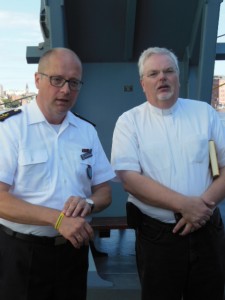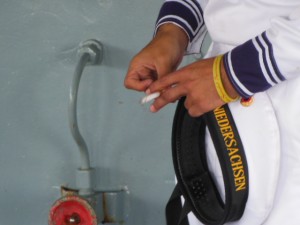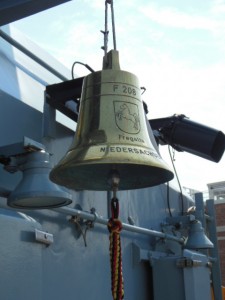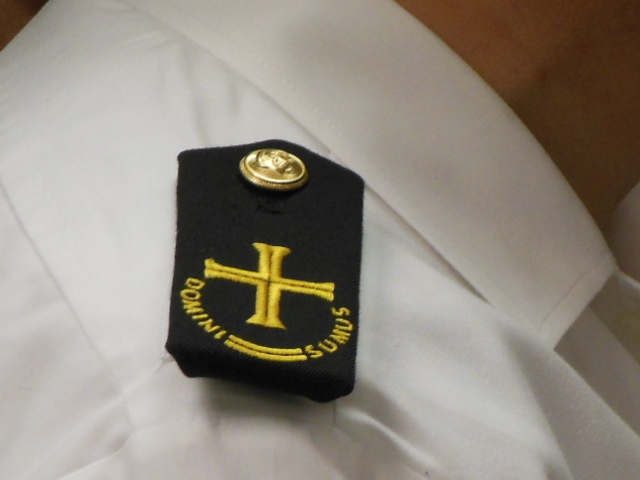German Navy Chaplain serves God while touching lives on the high seas
Christmas around the world is traditionally a time for family and friends. But what if your work necessitates separation and takes you someplace where even a simple phone call may be out of the question?
Ekkehart Woykos has seen the desolation and heartache such a life can engender in his capacity as a chaplain with the German Navy.

Woykos’ latest ship, the frigate FGS Niedersachsen was in Baltimore recently for a courtesy call as part of a NATO contingent. With the interpretive help of Rev. Dr. Holger Roggelin of the Zion Church of Baltimore, The Baltimore Post-Examiner spoke with Woykos about his life as a ship’s chaplain and about the challenges of serving God and his fellow countrymen at sea.
“The German Navy is a relatively small force today,” the unassuming chaplain began, “compared to its strength before reunification. In the days of the old Federal navy, Germany boasted a fleet of 260 ships. Today we have about 60. We went from10,000 to now 1500 men and women who wear the uniform.”
“There are just fifteen Protestant and three Catholic ministers who rotate throughout the fleet. Chaplains serve on one ship for three months at a time, then disembark. Altogether, each spends about 150 days on various ships. This year, I was on three different ships – two frigates and a logistics ship. Last November, I was aboard a ship which patrolled the Horn of Africa in response to the threat of Somali pirates. When I went home, I was assigned to serve on the successor ship.”
Unlike the U.S. military, in the German Navy, Woykos is considered a civilian. There is no rank with his uniform, and in time of war he would be considered a non-combatant.
German chaplains are financed by the military but remain under the authority of their church’s bishop. Woykos said his home synod assigned him to this mission, and he will serve in this capacity for 12 years.
Seeing to the spiritual needs of sailors requires a whole host of people skills. Woykos’ educational background is the same as that of a parish pastor; four years at a theological university, followed by two years of practical education. But even so, there are intangibles only experience can offer.
“It is almost impossible to describe life on board – you really have to live it,” he said.
About twenty-five officers and seamen regularly attend services on the Niedersachsen, which are held, weather permitting, on the topside Admiral’s deck. There, a circular mess table is used for an altar and wooden benches double as pews. After worship, the crew may enjoy a time of fellowship, along with coffee mixed with a little liqueur.

Though many sailors come from the largely atheistic former East Germany and therefore do not attend the religious services, all on board know the ship’s chaplain. Every chaplain in the German service must teach ethics along with offering pastoral care. The best way to do both is to be an active presence in the life of the ship. There is no real office on board, so Woykos continually walks about and greets men and women as he meets them.
After 8pm, most of the daily bustle has subsided, offering Woykos a chance to move around and talk with the crew in a more relaxed setting. With the shift rotation, this allows the chaplain to interact with everyone on board at least once every three days.
“The advantage to this approach is: When the men talk about the difficulty of being away from home, I can relate because I am part of their environment. In the German system, chaplains are not in the chain of command, so when people come to talk about their problems, they don’t have to fear that what they say will go onto a report. Also, officers cannot interfere with the chaplain. He has immediate access to everybody – even the captain of the ship. Everyone from top to bottom can come and talk, not only about issues of being away from home and family, but also problems within the system if they feel they are being treated unfairly, or if they feel there are problems aboard ship.”
“The biggest challenge is in being on duty 24/7. There is really no private sphere on board a ship for a chaplain.”
“There is nothing we cannot talk about, but for sensitive matters, we will seek out a private area. This is not always easy, because most every place aboard ship is constantly in use.”
A private area may be the relative quiet of the schanz deck (bastion) just below the helicopter hanger. Or it could be the wooden benches the crew cobbled together beneath the Harpoon missile battery.
One reoccurring area of concern is loneliness. The ships are at sea for five months at a stretch and in that time, seamen are largely cut-off from life back home. Sadly, about 80% of the marriages end in divorce.

“A ship board phone is available to crew members for 30 minutes each week – hardly enough time for a young seaman to keep up a relationship with his girl back home. If they want more, they have to pay for it, but there is just the one phone. No cell service and no Skype. They can write emails – which are uploaded every 30 minutes – but otherwise there is no internet access.”
Woykos said the limited access increases the feeling of being cut off from what is going on back home. In one case, a sailor accessing his cell phone for the first time in several weeks discovered a relationship ending message from his girl, saying, ‘This is it – for the rest, our lawyers can talk.’”
“In such cases, the German Navy will try to get the seaman back home as quickly as it can, but it is not always possible when a ship is on deployment.”
On a ship the size of the Niedersachsen, there are 180 permanent crew members. When they were cruising the waters off the coast of Somalia, there were another 45 people on board, including the helicopter pilots and their support teams, along with a special medic team for combat injuries. Each ship has a regular doctor, but with larger deployments, they also have a surgeon, an anesthesiologist and a dentist aboard. They will also take on a JAG (legal) officer.
To maintain order, the crew is divided into four mess groups. These groups dine together and share on board activities such as movies and games.
“It sounds nice, until you realize you’re sharing your living room sofa with the same 40-60 people.”
Caring for the spiritual needs of so many men and women within the confines of a ship requires not only training but some ingenuity. On the Niedersachsen, the ship’s brass bell doubles as a baptismal font (baptisms and weddings are engraved on the bell.) And the helicopter flight deck is used for Christmas services.

This Christmas, the frigate (which returned to Germany on December 1) will join other ships of the fleet at their home port of Wilhelmshaven. On Christmas Eve, they will hold a service for the men on board. The entire city is welcomed to this service, so about 350 people are expected to participate, followed by the German tradition of a little celebratory schnapps.
This will mark the last such service the Niedersachsen will be a part of.
As the oldest ship in the German Navy, the Niedersachsen has come to the end of its useful life. It will be decommissioned, then slowly salvaged for useable parts.
In 2015, Woykos will sail on three more ships – walking the decks, encouraging the crews and offering an understanding ear. He will also be there – most importantly – to minister to their spiritual needs.
“Last year, I was at sea for Totensonntag, which is the last Sunday before Advent – equivalent to your All-Saints service. After the service, a sailor approached me and said he had received word that his grandmother-in-law was about to die. He knew he would not be able to attend her service when she passed and asked if it would be possible to hold a memorial service on board when she finally passed?”
“Of course I agreed, and when the day came, we repaired to the schanz deck. The sailor had purchased a small ceramic piece in Oman and had inscribed it with her date of birth and date of death. The sailor threw this memento into the sea and we said a prayer. The event was entered in the ship’s log with the time and location of the vessel.”
“This is an example of what I do on board this ship.”
* * * * *
Editor’s note: This is the seventh part of an ongoing series which will look at the places and people that make up the rich history and diverse nature of spirituality, belief and observance in Baltimore and beyond. Read the series here.

Anthony C. Hayes is an actor, author, raconteur, rapscallion and bon vivant. A one-time newsboy for the Evening Sun and professional presence at the Washington Herald, Tony’s poetry, photography, humor, and prose have also been featured in Smile, Hon, You’re in Baltimore!, Destination Maryland, Magic Octopus Magazine, Los Angeles Post-Examiner, Voice of Baltimore, SmartCEO, Alvarez Fiction, and Tales of Blood and Roses. If you notice that his work has been purloined, please let him know. As the Good Book says, “Thou shalt not steal.”

